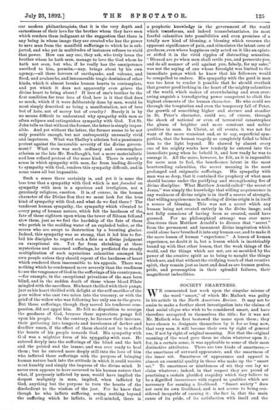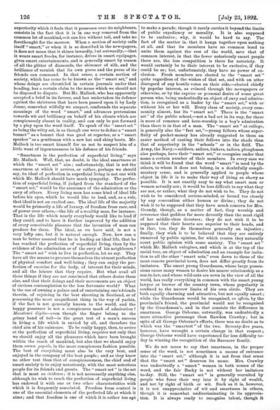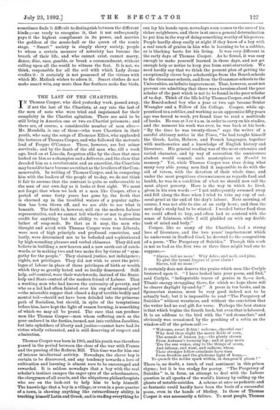SOCIETY SMARTNESS.
WE commented last week upon the singular misuse of the word " smart," of which Mr. Mallock was guilty in his article in the North American Review. It may not be amiss to make a further short investigation into the claims of that social clique who wish to be considered smart, and have therefore arrogated to themselves the title ; for it was not Mr. Mallock who first bestowed the name upon them ; they have chosen to designate themselves by it for so long now, that very soon it will become their own by right of general use, if not by right of original meaning. Not that the original meaning of the word gave them no claim whatever upon it ; for, in a certain sense, it was applicable to some of their most distinctive attributes. There are two kinds of smartness,— the smartness of outward appearance, and the smartness of the inner wit. Smartness of appearance and apparel is almost an essential quality in those who make up the " smart set." To smartness or nimbleness of wit they can lay no claim whatever ; indeed, in that respect they are proud of practising a certain glorified stupidity which they believe to be a dignified insouciance with regard to qualities which are
necessary for earning a livelihood. " Smart society " does not earn its own livelihood, and is not averse to being con- sidered incapable of earning it : the fact is, that the main cause of its pride, of its satisfaction with itself and the superiority which it feels that it possesses over its neighbours, consists in the fact that it is in one way removed from the common lot of mankind,—it can live without toil, and take no forethought for the morrow. When a section of society calls itself " smart," or when it is so described in the newspapers, it does not mean that it shines inwardly, but outwardly,—that it wears smart frocks, for instance, drives in smart equipages, gives smart entertainments, and is generally smart by reason of all the glitter of diamonds, the shimmer of silk, and the brilliance of varnish that its own purse and the purse of its friends can command. In that sense, a certain section of society, which has come to be known as the " smart set," and whose doings are chronicled in certain journals under that heading, has a certain claim to the name which we should not be disposed to dispute. But Mr. Mallock, who has apparently accepted a brief in its favour, and has undertaken its defence against the strictures that have been passed upon it by Lady Jenne, somewhat wilfully we suspect, confounds the separate meanings of the word " smart," and advances pretensions towards wit and brilliancy on behalf of his clients which are conspicuously absent in reality, and can only be put forward by a play upon the word itself. To speak of the " smart set " as being the witty set, is as though one were to define a " smart bonnet" as a bonnet that was good at repartee, or a " smart speaker" as a gentleman with a new bat and shiny boots. Mr. Mallock is too smart himself for us not to suspect him of a little want of ingenuousness in his defence of his friends.
"Smartness is the perfection of superficial living," says Mr. Mallock. Well, that, no doubt, is the ideal smartness at which the "smart set" aim ; unfortunately, that is not the smartness at which it arrives, or rather, perhaps we should say, its ideal of perfection in superficial living is not one with which Mr. Mallock should have much sympathy. The perfec- tion of superficial living, if judged from the standard of the " smart set," would be the assurance of the admiration or the envy of others. Every living man has some kind of ideal life before his eyes, which he would like to lead, and, as a rule, that ideal is not an exalted one. The ideal life of the majority would be primarily a life of luxury, of freedom from care, and of power over others,—the life of a wealthy man, for instance. That is the life which nearly everybody would like to lead if they could, and to have it further improved by the addition of every conceivable pleasure that the invention of man can produce for them. The ideal, as we have said, is not a very lofty one, but it is natural enough. Now, bow can a man be better assured that he is leading an ideal life, that he has reached the perfection of superficial living, than by the evidence of the admiration or of the envy of his neighbours ? The " smart set" wish to live in perfection, let us say. They have all the means to procure themselves the utmost perfection of physical comfort and well-being ; they can enjoy the per- fection of exercise for the body, of interest for their minds, and all the leisure that they require. But what avail all these things if they are not convinced that others desire them also, and that their doings and their movements are an object of envious contemplation to the less fortunate world ? What is the use of owning a palace and of entertaining one's friends therein, of rejoicing in the best shooting in Scotland, or of possessing the most magnificent thing in the way of yachts, if the fact is not generally known to the world, and the happy possessor is not a conspicuous mark of admiration ? Monstrari digito—even though the finger belong to the grimy hand of toil—is the great test of a man's success in living a life which is envied by all, and therefore the chief aim of his existence. To be really happy, then, to arrive at the perfection of superficial living, requires not only that we should enjoy all the pleasures which have been brought within the reach of mankind, but also that we should enjoy them coram populo, in the most conspicuous fashion possible. The best of everything must also be the very best, and enjoyed in the company of the best people ; and as they know no other test than that of conspicuousness, the chief end of smart society is to enjoy notoriously, with the most notorious people for its friends and guests. The " smart set" is the set that is most en evidence; it is not necessarily anything else, although its wish to reach the perfection of superficial living has endowed it with one or two other characteristics with which it is frequently associated. Freedom from control is one of the essential elements of the perfected life at which it aims; and that freedom is one of which it is rather too apt
to make a parade, though it rarely carries it beyond the limits of public expediency or morality. It is also supposed to be exclusive ; why, it would be hard to say. The fact of the matter is, that it hangs together upon nothing at all, and that its members have no common bond to unite them against the rest of the world, save that of common interest, in that the fewer notoriously smart people there are, the less competition is there for notoriety. It would certainly be to their interest to be exclusive, if they could be so; but, unfortunately, they have no power of ex- clusion. Fresh members are elected to the " smart set " quite regardless of the wishes of that set, and with an utter disregard of any hostile votes on their side,—elected chiefly by popular interest, as evinced through the newspapers or otherwise, or by the caprice or personal desire of some great person who, being undoubtedly an object of envy and admira- tion, is recognised as a leader by the " smart set," with or without his or her will. Every class of society, every com- munity almost, has its "smart set." There is the "smart set" of the public school,—not a bad set in its way, for there is more of romance and hero-worship in a boy's admiration than there is in that of a man. The " smart set " at college,. is generally also the " fast set,"—young fellows whose super- fluity of pocket-money has already suggested to them an easier method of casting their fellows into the shade than that of superiority in the " schools " or in the field. The- Army, the Navy,—soldiers, sailors, tinkers, tailors, ploughmen also perhaps, have their " smart set," or recognise under that name a certain number of their members. In every case we think it will be found that the word " smart " is used by the others, to whom it does not belong, in a doubtfully compli- mentary sense, and is generally applied to people whose- object in life it is to make their way of living as showy as- possible. It is not exactly easy to say what smart men or women actually are ; it would be less difficult to say what they- are not, or rather, what they do not wish to be. They do not wish to be considered serious-minded, or bound too closely by any convention either human or divine ; they do not wish it to be supposed that they have much concern for Mrs. Grundy, though, as a matter of fact, they worship and reverence that goddess far more devoutly than the moat rigid of her middle-class devotees; they do not wish it to be supposed that their hearts are superior to their heads, and in that, too, they do themselves generally an injustice ; finally, they wish it to be believed that they are entirely unmoved by public opinion, for which reason they naturally court public opinion with some anxiety. The "smart set" which Mr. Mallock eulogises, and which is at the top of the social tree, an object of admiration and an example for 'imita- tion to all the other " smart sets," even down to those of the- most remote provincial town, does not differ greatly from its. imitators. The smart young Guardsman, whose large posses- sions cause many women to desire his nearer relationship as a son-in-law, and whose wild-oats are sown in the view of all the world, has really everything in common with the smart young lawyer or brewer of the country town, whose popularity is- confined to the narrow limits of his own circle. They are both equally charming and attractive, but not equally smart; while the Guardsman would be recognised, ex officio, by the provincial's friend, the provincial would not be recognised, by the Guardsman's, and in that consists the difference in smartness. George Osborne, outwardly, was undoubtedly a more attractive personage than Rawdon Crawley ; but in spite of all George Osborne's efforts, there was no doubt as to which was the " smartest " of the two. Seventy-five years, however, have wrought a certain change in that respect ; George Osborne would have experienced far less difficulty to- day in winning the recognition of the Bareacre family.
We do not mean to say that smartness, in the proper sense of the word, is not sometimes a means of entrance into the " smart set," although it is not from that sense that the "smart set" deserves its name. Mrs. Crawley was undoubtedly a " smart" woman in both senses of the word, and the fair Becky is not without her imitators to-day. Still, the "smart set" is generally recruited by people who force their way into it by right of wealth, and not by right of birth or wit. Such as it is, however, it is not unappreciative of wit and smartness in others, though it is somewhat undiscriminating in its apprecia- tion. It is always ready to recognise talent, though it sometimes finds it difficult to distinguish between the different kinds ;—so ready to recognise it, that it not unfrequently pays it the highest compliment in its power, and marries the goddess of the music-hall or the queen of the comic stage. " Smart " society is simply showy society, people to whom a certain measure of notoriety has become the breath of their life, and who cannot exist, cannot marry, dance, dine, race, gamble, or break a commandment, without calling upon all the world to witness the feat. It is not, we think, responsible for all the evil with which Lady Jeune credits it : it certainly is not possessed of the virtues with which Mr. Mallock wishes to adorn it. . Smart clothes do not make smart wits, any more than fine feathers make fine birds.




































 Previous page
Previous page